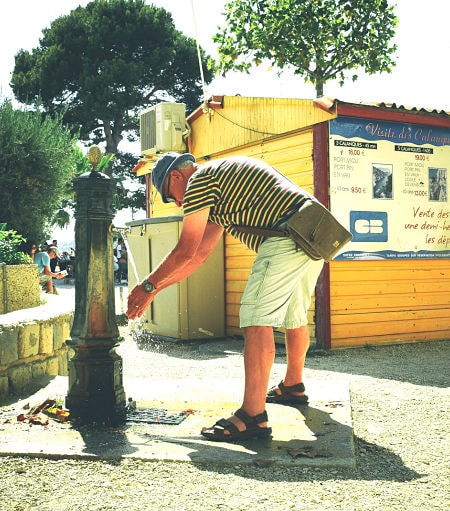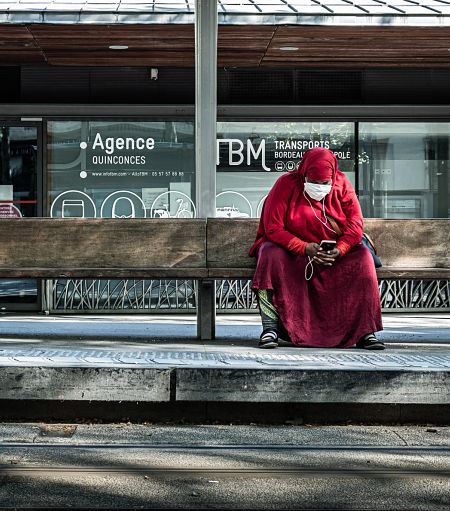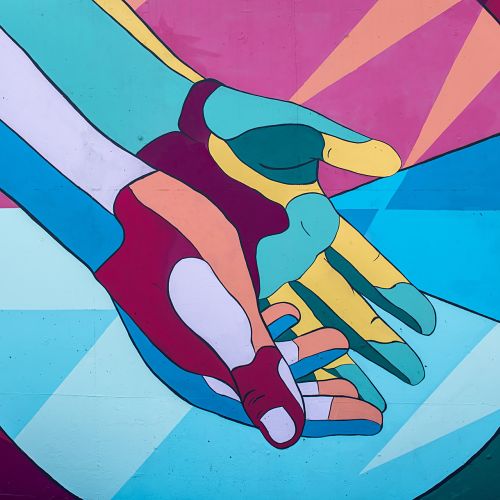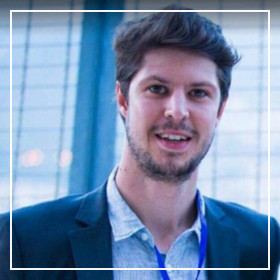Since the beginning of the Covid-19, Muslim NGOs have been at the forefront of the crisis in France. Their implication at the national level challenges negative stereotypes on Islam in France and potentially reshapes their relations with public authorities in the provision of welfare services.
Covid-19 rapidly spreads in the entire world. We need to stick together, as only a global response would be able to stop the virus proliferation. (…) We try to support vulnerable people in France, but it is also crucial to keep in mind refugees and displaced persons abroad who risk once again to be victims if no one can contain the epidemic (…).
As France is being struck by the Covid-19 pandemic, the message above was captured during a live-stream video on the Facebook page of Human Appeal France, one of the biggest French Muslim NGOs. While the whole country is in lockdown after President Macron’s official announcement, Muslim NGOs have deployed their aid nationally with the intent to help people directly affected by the virus. For many organisations, it was unprecedented and required important adjustments to maintain their activities. At the same time, they have mobilized their staff and donors for long-term programmes as the virus would soon reach other parts of the world and the consequences might be even worse. The arrival of Ramadan campaigns in April and May when religious donations generally increase has strengthened their mobilization.
In what ways are French Muslim NGOs contributing and taking action during the Covid-19 crisis? What can we learn about Muslim humanitarianism through their involvement in fighting the pandemic in France?
Spontaneous reactions and national solidarity
Muslim NGOs have been at the forefront of active intervention since the beginning of the public health emergency in France, providing support to the vulnerable populations impacted by the virus. They have been helping homeless people, asylum seekers, migrants and low-income families, but have also enlarged their regular operations to aid health staff and workers in precarious living conditions. For instance, they have helped those individuals that were forced to stop their professional activities by delivering them with food provisions or volunteering to take care of the medical staff’s children when their parents are at work. Many NGOs have also provided technical assistance to health institutions, such as hospitals, and offered medical supplies, (e.g. respirators, surgical masks and hydro-alcoholic gel). To carry out their actions, the organisations have launched multiple online fundraising campaigns which have been highly successful. For example, Barakacity, one of the most visible NGOs online has conducted daily donation challenges to reach 200 donations every 24 hours.
The actions of Muslim NGOs in times of crisis are characterized by a dual trend. Not only do they maintain their ordinary activities, but they also increase them as they try to fill the gap caused by the withdrawal of many other associations.
This is possible since their members are usually relatively young and therefore less subject to the confinement measures. Following with the second trend, the Muslim NGO’s capacity to respond to the crisis has increased their public visibility and their active partnerships with other associations in need of volunteers and with the overwhelmed public services. At the same time, they have been taking advantage of their strong presence on social media to communicate official instructions and guidelines from authorities. They have published advice regarding the necessity to respect quarantine, social distancing and how to act in these troubled times. As such Muslim Hands France shared detailed explanations on how to wash one’s hands and explained “cleanliness is part of the faith”. What emerged as a shared value among Muslim NGOs has been the promotion of a typical vision of aid that was not only restricted to material needs. They have encouraged their volunteers and donors to promote local solidarity with their neighbours, particularly towards elders or isolated populations unable to cover their basic expenses.

Challenging negative representations of Islam
This period exemplifies and probably accentuates many major factors that I have witnessed among Muslim NGOs over the last few years. It underlines the dynamic nature of these associations and their popularity as they enjoy increasing public visibility, significant financial support and the development of a positive appearance which also enables a strong mobilizing capacity. With an important work presence in the French cities, their strong response to the pandemic has also demonstrated the vitality of volunteers in these associations where a large proportion of the staff and volunteers whom are born and educated in France are highly qualified.
Despite their involvement, Muslim NGOs remain unknown and relatively side-lined for their actions, which is likely the most recurring prejudice they face.
They suffer from a lack of recognition, and, occasionally, from the mistrust of the government, humanitarian organisations and European public opinion. Indeed, Muslim NGOs face suspicion at the international level since 9/11 and the global “War on terror” led by the Bush administration. At the national level, they navigate in a relative hostile environment due to the French secularist regime (namely “laïcité”) in which religion tends to be relegated to the private sphere. The establishment of Islam as a “public issue” since the 1980s (Talpin, O’Miel, Frégosi, 2017, p.27), the rise of Islamophobia in public discourse and the permanent debate on radicalization have also tarnished their image towards a broader audience.
In that regard, the crisis has probably contributed to bring to light the true value of Muslim NGOs, their daily participation and role in French society even as part of a “minority” group (Ndiaye, 2008). Once again Barakacity is undoubtedly one of the most salient illustrations. The NGO, which has long been negatively portrayed in the media and even accused of money laundering by French authorities, has distributed masks to health personnel in hospitals, even when the state failed to do so. Such actions vividly challenge dominant and negative stereotypes about Islam, often considered a “threat” to democratic values, and underlines the growing concerns of Muslim NGOs for domestic needs. It is worth highlighting that even when these organisations are not widely accepted in French society, they have contributed to ease the effects of the pandemic in France.
Articulation of local and global actions
A socio-historical perspective is needed to better understand the NGO’s active participation in domestic affairs. The oldest Muslim NGOs in France originated from the United Kingdom as the main British charities opened branches in France starting in the 1990s. France was perceived as a strategic location with one of the largest Muslim population in Europe. Secours Islamique – the former branch of Islamic Relief -, Human Appeal, Human Relief Foundation, Muslim Hands, are great examples of this. Originally, France was only considered a “market” for fundraising and French branches essentially had to activate the so-called “distant suffering” [la souffrance à distance] conceptualized by Luc Boltanski (1993). The idea was to make French Muslims aware of the situation of the faraway “Umma” (the Muslim community) in need. The money collected was sent to the head offices in the UK, where it would be allocated to the different projects, which were mainly international.

The current global crisis gives a meaningful illustration of the Islamic charitable work addressing needs both “at home” and abroad. Since the 2010s, most French Muslim NGOs have tried to combine humanitarian action abroad with social action in France. Indeed, a wave of change has been observed with the creation of national and local programs among “Franco-British” organisations. A new generation of organizations has also emerged, created by young French Muslims who mainly originate from poor neighbourhoods or French “banlieues”. There are many reasons to explain this change of attitude towards local action, but the so-called “refugee crisis” has constituted a turning point with a “humanitarian” emergency in France. Another important aspect refers to the general context previously addressed and seems to be the desire and necessity for Muslim NGOs to gain public legitimacy and recognition nationally. For the oldest NGOs have long been perceived as “imported” organizations and regarded with suspicion due to their foreign identities: both as British and Muslim. However, the youngest associations continue to suffer from negative representations and stigma associated to being young and Muslim who hail from (supposedly) unruly, dangerous and dirty places, which have been particularly affected by confinement measures.
By acting locally and taking into account French domestic needs including fellow non-Muslim citizens, Muslim NGOs apply, more and more, the saying “charity begins at home”. They thereby offer “evidence” of their French citizenship in addition to contributing to the common good. One can imagine the on-going crisis will continue to play a considerable role in shaping Muslim NGOs’ local perception and potentially reconfigures the relationship between Muslim NGOs and French authorities. Due to their importance, Muslim NGOs complement or even present an alternative to public welfare services for the most vulnerable people.
Nevertheless, as I illustrated in the introduction, the organisations’ actions in France cannot be disjointed from global solidarity towards all of those individuals in need.
Similar to the virus, which does not recognize borders, neither do Muslim NGOs which promote universal aid.
Constant parallels are drawn between French needs and the challenges awaiting abroad, for instance, Palestinians and Rohingyas, people in Syria and in refugee camps in Greece. From a religious point of view, local action and actions abroad are part of an analogue Muslim humanitarianism and must, from a sociological point of view, be woven together through the concept of bienfaisance, “doing good” (Faure, 2020), used as a broader category of analysis.
Bibliography
Benthall Jonathan, Bellion-Jourdan Jérôme., The Charitable Crescent : Politics of Aid in the Muslim World, Londres, I.B. Tauris, 2003.
Boltanski Luc, La Souffrance à distance, Morale humanitaire, médias et politique, Paris, Ed. Editions Métailié, 1993.
De Cordier Bruno, « Faith-based aid, globalisation and the humanitarian frontline: an analysis of Western-based Muslim aid organisations », Disasters, 2009-octobre, p.608-628.
Faure Lucas. «L’agir « ici » et « là-bas » : questionner les catégories des pratiques du bien au prisme du Secours Islamique France», in Ruiz de Elvira, Laura et Saeidnia, Sahar (dir.), Les mondes de la bien-faisance. (Se) mobiliser pour le « bien », (se) gouverner par le « bien », Paris, CNRS Editions, 2020.
Ndiaye Pap, La condition noire : essai sur une minorité française, Paris, Calmann-Lévy, 2008.
Petersen Marie-Juul, For humanity or for the umma? Ideologies of aid in four transnational Muslim NGOs, University of Copenhagen, 2011.
Talpin Julien, O’Miel Julien, Fregosi Franck, L’islam et la cité – Engagements musulmans dans les quartiers populaires, Ed. Septentrion, 2017.
Featured image by Tim Mossholder on Unsplash





